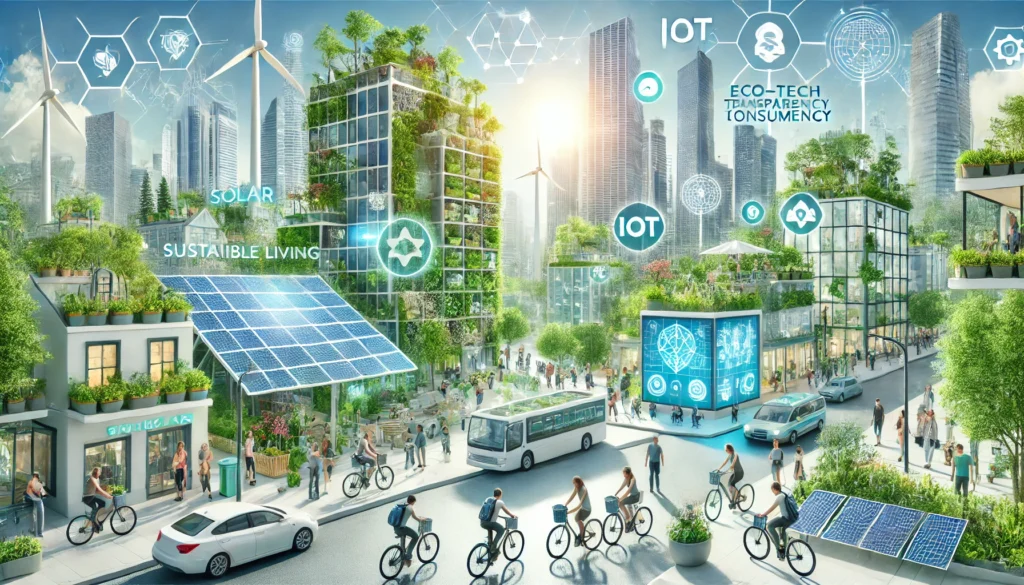
In an era defined by climate change and environmental challenges, sustainable living and green consumerism are essential for fostering a healthier planet for future generations. By integrating cutting-edge technology into these practices, individuals and businesses alike can amplify their efforts and create a significant impact.
The Role of Technology in Sustainable Living
Modern technologies provide innovative solutions to reduce waste, conserve resources, and lower carbon footprints. Here are some top new technologies making strides in sustainability:
- Renewable Energy Technologies: Advances in solar panels, wind turbines, and battery storage are enabling homes and businesses to transition away from fossil fuels. Smart grids powered by artificial intelligence (AI) are optimizing energy distribution and reducing wastage.
- Internet of Things (IoT): IoT devices like smart thermostats, water sensors, and energy monitors allow users to track and minimize their resource consumption. For example, smart irrigation systems in agriculture ensure water efficiency by analyzing soil conditions and weather data.
- Blockchain and Cryptocurrency: Blockchain technology is revolutionizing transparency in supply chains, helping consumers identify eco-friendly and ethically sourced products. Cryptocurrencies built on energy-efficient algorithms, like proof-of-stake, are also emerging as greener alternatives to traditional cryptocurrencies.
- Big Data and Data Analytics: Harnessing big data enables better understanding and management of environmental resources. Analytics tools help identify trends in energy use, waste generation, and pollution levels, empowering more effective sustainability strategies.
- Cloud Computing: By facilitating remote work and reducing the need for physical office spaces, cloud computing contributes to lower emissions. Green cloud solutions also prioritize energy-efficient servers and carbon-neutral data centers.
Software Innovations Promoting Sustainability
Software development plays a pivotal role in driving sustainable practices. Some key areas of impact include:
- AI and Machine Learning: AI-powered applications optimize waste management, predict energy demands, and support circular economy initiatives. ML algorithms help businesses track their carbon footprints and suggest actionable improvements.
- Cybersecurity for Green Tech: As more devices connect to the IoT, robust cybersecurity measures ensure the safe deployment of energy-efficient technologies without compromising user data.
- Ecommerce and Digital Marketing: Sustainable ecommerce platforms are leveraging AI to recommend eco-friendly products to consumers. Digital marketing campaigns that highlight green initiatives encourage ethical consumption.
- UX and UI Design: User-friendly interfaces in sustainability-focused apps and devices ensure broader adoption. For instance, apps promoting zero-waste lifestyles or carbon tracking rely on intuitive design to engage users effectively.
Green Consumerism and Emerging Technologies
Green consumerism aligns with the use of technology to make informed purchasing decisions. Innovations such as:
- Tech Gadgets: Devices like solar-powered chargers, energy-efficient appliances, and reusable tech accessories contribute to reducing individual carbon footprints.
- Blockchain for Ethical Products: Blockchain-based platforms verify product claims, such as organic certification or fair-trade practices, giving consumers confidence in their purchases.
- Big Data in Product Development: Analyzing consumer trends with big data enables companies to design products that meet eco-conscious demands.
Businesses and Green Technology
Enterprises play a critical role in sustainability by leveraging modern technologies to:
- Adopt DevOps Practices: Streamlining software development processes with DevOps minimizes waste and improves energy efficiency in IT operations.
- Promote Circular Economy Models: IoT-enabled systems and AI-driven analytics help businesses implement recycling and upcycling strategies.
- Enhance Transparency: Digital tools such as blockchain ensure businesses can demonstrate their commitment to ethical practices and environmental stewardship.
The Future of Sustainable Living
Technology’s role in advancing sustainable living and green consumerism is undeniable. By integrating innovations like AI, IoT, and blockchain, individuals and businesses can combat environmental degradation and preserve natural resources. Practical steps to embrace sustainability include:
- Adopting Smart Home Solutions: Utilize IoT devices to optimize energy and water use at home.
- Supporting Green Brands: Leverage blockchain tools to verify a brand’s eco-friendly claims.
- Embracing Digital Workspaces: Transition to cloud-based systems to reduce environmental footprints.
With advancements in technology and a growing commitment to sustainability, a greener future is within reach. Explore more resources and tools for sustainable living at btdd.online. Together, we can harness technology to create a thriving, eco-conscious world for generations to come.